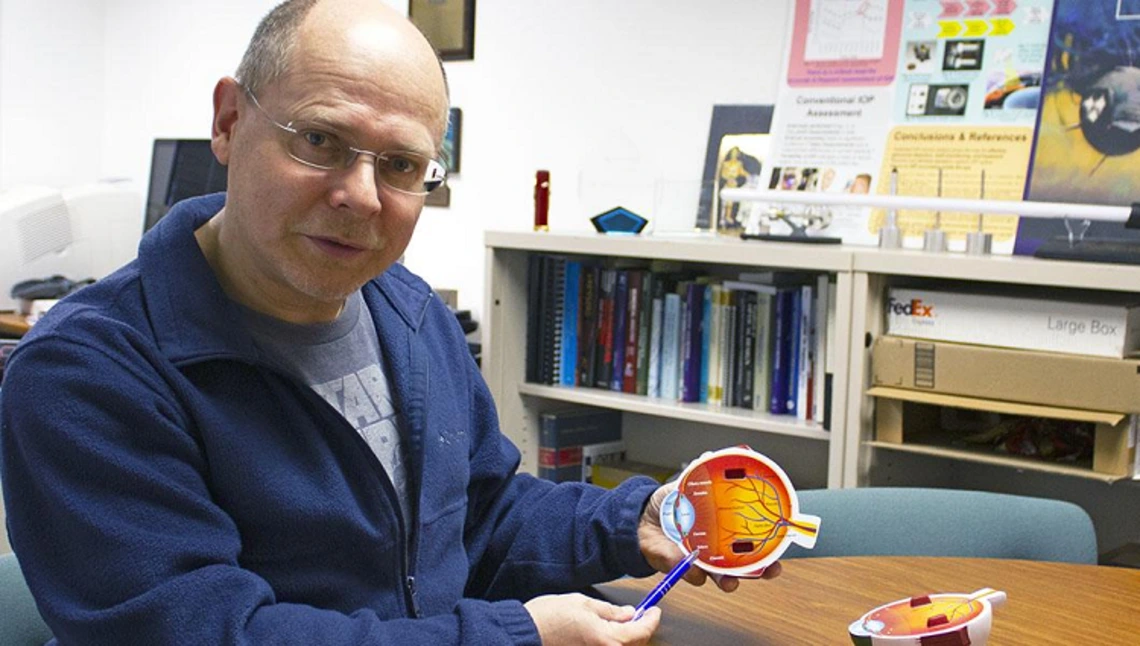Fink Recognized With 2023 SPIE Technology Achievement Award

BME associate professor Wolfgang Fink is the recipient of this year's SPIE Aden and Marjorie Meinel Technology Achievement Award. This SPIE, or International Society for Optics and Photonics, award recognizes outstanding technical accomplishments in optics, electro-optics, photonic engineering, or imaging.
Fink helped bring several vision-related devices and diagnostic technologies to market. His 20 U.S. and six foreign patents to date reflect innovations in tele-ophthalmology and ocular healthcare, including worldwide accessible visual performance tests, smartphone-based ophthalmic examination devices, a wireless implantable intraocular pressure sensor system to assist glaucoma therapy, and performance improvements for visual prostheses that advance the visual experience for the blind. Fink is the author of over 260 publications and holder of six fellowships.
Fink said he is grateful to receive an honor that celebrates the legacy of Aden and Marjorie Meinel and that places him in an esteemed class of awardees.
“I am deeply honored and humbled to be recognized alongside giants in astronomy, optics and optical sciences,” he said. “My profound gratitude goes to the SPIE and my peers worldwide for acknowledging my contributions to transformational opto-medical examination and device technologies in ophthalmology and tele-ophthalmology over the last 30 years.”
Fink holds a number of appointments, including the inaugural Edward & Maria Keonjian Endowed Chair, associate professor of ophthalmology and vision Science, biomedical engineering, and systems and industrial engineering. He was also a senior researcher at NASA’s Jet Propulsion Laboratory. Fink’s professional journey contains overlaps with that of both the Meinels.
From 1964 to Now
The UA is internationally renowned for optics and photonics. The College of Engineering and the Wyant College of Optical Sciences partner to fulfill a national need for engineers and physicists in the optical sciences, educating more optics students than any other U.S. institution.
Many would point to 1964, when Aden Meinel founded the UA Optical Sciences Center, now the Wyant College, as a defining moment in the UA’s storied optics history. Aden came to the UA in 1961 as an astronomy professor and the director of the Steward Observatory. Marjorie, also an astronomer, raised the couple’s seven children and worked as Aden’s editor and co-author. When Marjorie died in 2008, the couple had been married 64 years. Aden died in 2011.
As the founder and director of the Visual and Autonomous Exploration Systems Research Laboratory, Fink is building on work he began at JPL 20 years ago. Conversely, Aden Meinel served as a UA professor for many years before he and Marjorie Meinel both went to work for JPL. SPIE selected both Fink and Aden Meinel as fellows.
Fink’s expertise extends beyond helping those with vision problems to autonomous robotic space exploration, cognitive and reasoning systems, and computer-optimized design. Fink’s varied skill set is something he holds in common with Aden Meinel, said Jennifer Barton, president-elect of SPIE and director of the UA’s BIO5 Institute.
"Wolfgang Fink and Aden Meinel share a love of forging new paths and having broad interests,” she said. “The University of Arizona is the perfect place for interdisciplinary work that draws upon and extends the field of optics.”
This latest international acknowledgement of Fink’s work, made in the name of UA pioneers in the discipline, has the potential to expand the university’s optical engineering reputation, according to Barton.
“We are perhaps best known for our large mirrors and space sciences projects, but this award highlights our newer but considerable strengths in biophotonics and biomedical engineering,” she said.
